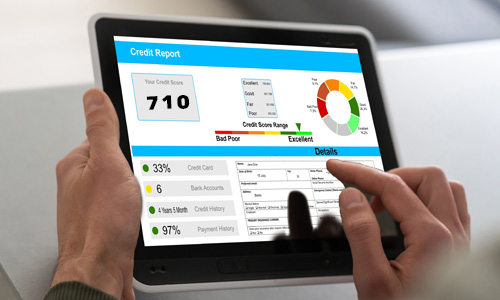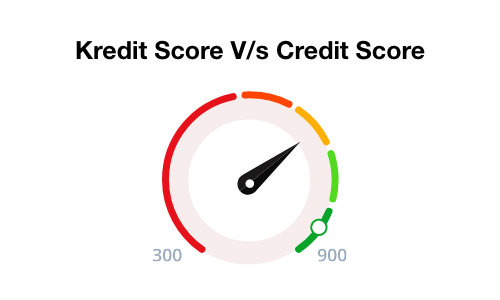How to Calculate Credit Scores in the UAE
Your credit score, a numerical representation of your credit history, plays a key role in determining your eligibility for loans, credit cards, and other financial products. Whether you're an expatriate or a UAE national, this article will serve as your comprehensive guide to demystifying the intricacies of calculating your credit score in the UAE.
We'll navigate through the factors that influence your credit score, explore the importance of maintaining a positive credit history, and provide practical insights into improving your financial standing. Moreover, we'll shed light on the Credit Bureau in the UAE and its role in this process, ensuring that you have all the tools and knowledge needed to take control of your financial future.
Without further ado, let's embark on this journey to financial empowerment by unravelling the mysteries of credit scoring in the UAE.
Purpose of Credit Score in the UAE
AECB credit scores rank among the most crucial details sought after by various lending institutions such as banks and financial entities. This is because a credit score serves as a direct reflection of an individual's or entity's creditworthiness.
Credit scores find multiple applications among different organisations:
- Banks utilise credit scores when reviewing applications for granting loans to individuals or businesses.
- Banks and credit card providers also rely on credit scores when assessing applications for issuing credit cards to individuals or businesses.
- Insurance companies may refer to credit scores when evaluating applications for insurance plans.
- Home rental agencies as well as landlords may use credit scores to assess rental applications submitted for properties. Other similar organisations follow this practice as well.
- Individuals and businesses turn to credit scores when seeking unsecured loans.
- Credit card companies utilise credit scores as a basis for determining credit limits and interest rates for their clientele.
- Employers incorporate aecb credit scores into their background checks when vetting potential employees.
- Utility companies leverage credit scores when deciding whether to offer services to customers on a postpaid basis.
- Government agencies refer to credit scores when evaluating the financial standing of individuals or businesses for licensing or regulatory purposes.
- Debt collectors rely on credit scores to gauge the likelihood of a debtor's ability to repay a debt.
- Investment firms employ credit scores as part of their risk assessment when considering potential clients for investment opportunities.
How to Calculate Credit Score in the UAE?
Your credit score is calculated by analysing more than 2,000 data elements drawn from diverse sources such as banks, financial institutions, telecommunications companies, and more.
Interestingly, credit scores are dynamic and keep adjusting based on your recent financial actions. For instance, even if you've been an exemplary borrower for many years, a few missed payments can promptly lower your score.
The calculation primarily relies on market data and factors in variables such as overdue balances, the count of credit cards held, and how much of your available credit you're using. Specifically, it accounts for adverse status indicators on these financial agreements, such as missed payments and the duration of delinquencies.
To calculate the credit score, you need to consider the following factors and their weightage -
Bill Payment History (35%) -
If you miss out on bill payments, it can affect your credit score adversely. This is because bill payment history is the primary factor that determines your credit score, weighing 35% of the credit score. This information indicates whether you consistently meet payment deadlines, how frequently you fail to make payments on schedule, the extent to which you exceed due dates for bill payments, and the recency of any missed payments.
Lenders usually report payments made more than 30 days late, which can lead to a decrease in your credit scores. The degree of delay in your bill payments, the number of accounts displaying overdue payments, and your efforts to bring those accounts up to date are all influential factors here. Your credit score increases as you accumulate more instances of making payments on time.
Each instance of missing payment has a detrimental effect on your credit score.
Extent of Personal Credit Card Debt (30%) -
The extent of your indebtedness represents the sum that you must settle in connection with your credit card statement. Essentially, it corresponds to the variance between your credit card's limit and the outstanding balance. To put it simply, if your credit card limit is frequently reached, it will impact your credit score. This aspect constitutes roughly 30% of your overall credit score.
This calculation takes into account your overall outstanding debt, the quantity and types of accounts you possess, and the ratio of money owed in relation to your available credit. Elevated balances and fully utilised credit cards will reduce your credit score, while smaller balances could potentially boost it – provided you make punctual payments.
New loans with a limited payment history might temporarily lower your score, while loans nearing completion could enhance it, as they reflect a track record of successful payments.
Note - If you are particularly interested in rebuilding your credit history, especially when starting from a very low credit score, the significance of your bill payment history and the level of your debt underscore why these two factors should be your primary focus.
Age of Personal Credit History (15%) -
Credit history age refers to the duration for which you have been utilising credit instruments such as a bank account or credit card. From the average age of your accounts to that of your oldest one, everything is considered when calculating your credit history's age!
The higher your history of making payments on time extends, the greater your credit score will become. When assessing credit history, credit scoring models generally examine the average age of your credit. This explains why you might want to contemplate keeping your accounts open and in active use.
While it might seem prudent to abstain from applying for credit or carrying debt, doing so might actually harm your credit score as it can lead to a lack of credit history to assess. This component accounts for approximately 15 percent of your overall credit score.
Type of Credit Account (10%) -
An individual's credit score is influenced by the specific credit accounts that they hold and how effectively they oversee them. A higher score is attained when both these accounts are managed well, with approximately 10% of the total score contingent on this aspect.
In the UAE, individuals can possess two distinct categories of credit accounts: instalment loans and revolving accounts.
A revolving account extends to the borrower a maximum credit limit and lacks a predefined maturity date. Conversely, an instalment loan demands regular fixed payments and has a specified maturity date.
Number of Credit Inquiries (10%) -
Much like the credit account category, the count of inquiries, especially those related to credit or loan transactions, carries a weight of approximately 10% in the overall score. It's important to note that while a few credit inquiries won't significantly affect your score, multiple inquiries can certainly have a negative impact.
Having opened numerous accounts or applying for new ones in a short period might indicate potential financial difficulties and could lead to a decrease in your credit score. Credit scoring models are designed to understand that recent loan-related activities do not automatically signify a high level of risk for the consumer.
Why Should You Track Your Credit Score?
Banks and financial institutions rely on your credit score to determine your suitability as a potential borrower. On top of quicker approvals, individuals with higher scores may even enjoy more favourable interest rates when seeking credit.
Your credit score also serves as a valuable starting point for identifying and rectifying any inaccuracies in your credit report as well as for enhancing your personal credit management practices.
Banks typically use credit scores to make a preliminary assessment when considering a credit application. However, they subsequently obtain the complete credit report to finalise the evaluation process.
One common misunderstanding among individuals is that their credit score, as provided by organisations like the AECB, solely determines whether a bank approves or rejects their credit application. In reality, while a bank may use a credit score or report as a reference, the final lending decision hinges on the bank's specific criteria at that particular instance.
How Does Credit Score Work?
The al etihad credit bureau (AECB) compiles an individual's credit report (which contains their credit score) by collating financial data from various sources and conducting a thorough analysis.
The bureau sources the financial data from banks, financial institutions, and telecom companies, amalgamating it into a comprehensive report. While some banks periodically provide customer information, others, like Union National Bank, follow a daily data submission protocol.
This report comprises important financial details, such as the count of loans and credit cards, the regularity of credit instalment payments, due dates, instances of delayed and skipped payments, credit limit utilisation, the number of debit cards held, and occurrences of bounced cheques, among others.
In addition to summarising existing loans, the report also enumerates previous loans and provides particulars about the number of loan applications made as well as their approval or rejection status from banks. The culmination of this information in the report results in our widely recognised metric — the credit score.
Where to Check Credit Score for Free?
Through a collaboration with the AECB, Policybazaar.ae offers you the chance to check your credit score range without any cost. Simply navigate to our website's 'credit score' section and fill out the necessary information in the credit score form to ascertain your credit score range.
Policybazaar UAE – Helping you navigate the wilderness of the insurance world!
| Credit Score for different types of Loan | |||
|---|---|---|---|
| Credit Score for Personal Loan | Credit Score for House Loan | Credit Score for Car Loan | Credit Score for Student Loan |

More From Credit Score
- Recent Articles
- Popular Articles












